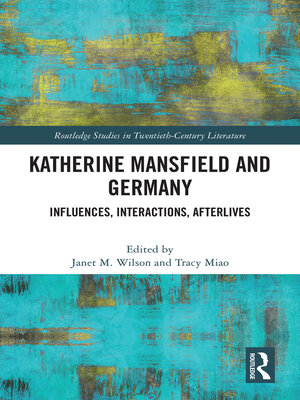Katherine Mansfield and Germany
ebook ∣ Influences, Interactions, Afterlives · Routledge Studies in Twentieth-Century Literature
By Janet M. Wilson

Sign up to save your library
With an OverDrive account, you can save your favorite libraries for at-a-glance information about availability. Find out more about OverDrive accounts.
Find this title in Libby, the library reading app by OverDrive.



Search for a digital library with this title
Title found at these libraries:
| Library Name | Distance |
|---|---|
| Loading... |
Katherine Mansfield and Germany is the first study of Mansfield's encounter with Germany and all things German: language, culture, society. This crucial area of her life and art has been relatively neglected, even though Germany held Mansfield in its thrall all her life, as myriad associations found in her fiction, notebooks, and letters confirm. Her immersion in the German language and culture was formative, influencing her early poetry and experimental prose writing, and as stories published in her first book In a German Pension (1911) show, was an important foundation for her cosmopolitan, (post)colonial modernism.
The 13 essays here offer insights onto the German intellectual and artistic heritages of the early 20th century that influenced Mansfield: Nietzsche in philosophy, the music of Wagner, the German Minnesänger and poetry, Heine's lyric verse, and German folk lore and fairy tales. They study the educational and romantic avenues to this heritage; her passion for the world of music through the Beauchamp family circle, her study of the cello, intense relations with the musical Trowell family, her "long[ing] for German" at Queen's College in London, because taught by the charismatic Walter Rippmann, and her crucially important seven-month stay in 1909 in the Bavarian spa town of Wörishofen, where she wrote the satires of In a German Pension. Mansfield's start as a professional writer is considered through biographical, psychoanalytical, and literary-critical readings: these include her literary responses to Bavarian culture, her fraught personal circumstances, her antipodean modernist practice of transposing New Zealand perspectives onto the "Germanic" narrative space, her use of Sekundenstil, her satire of Bavarian patriarchal attitudes, and her adaptations of Märchen. There are historical readings of Wörishofen and Rotorua as spa towns renowned for alternative health cures, of Mansfield's publications in the New Age in 1910 in light of debates about women's emancipation and accelerating Anglo-German tensions prior to World War One, while her German legacy is approached through a study of translations of her stories made under Nazi socialism and the German Democratic Republic.
In examining the enduring impact of German literature, philosophy, and music on Mansfield's artistic and intellectual development, this volume expands knowledge of the diversity of the continental landscapes that shaped her world view.
Katherine Mansfield and Germany will be of principal interest to Katherine Mansfield scholars. It will also attract a broader readership, primarily of academics, especially scholars working in modernist studies, and graduate students interested in trans-national modernism, and crossovers between German and English literary, musical, and historical studies. This includes members of the public in Germany and elsewhere with an interest in Mansfield's contintental, specifically German associations and influences.







